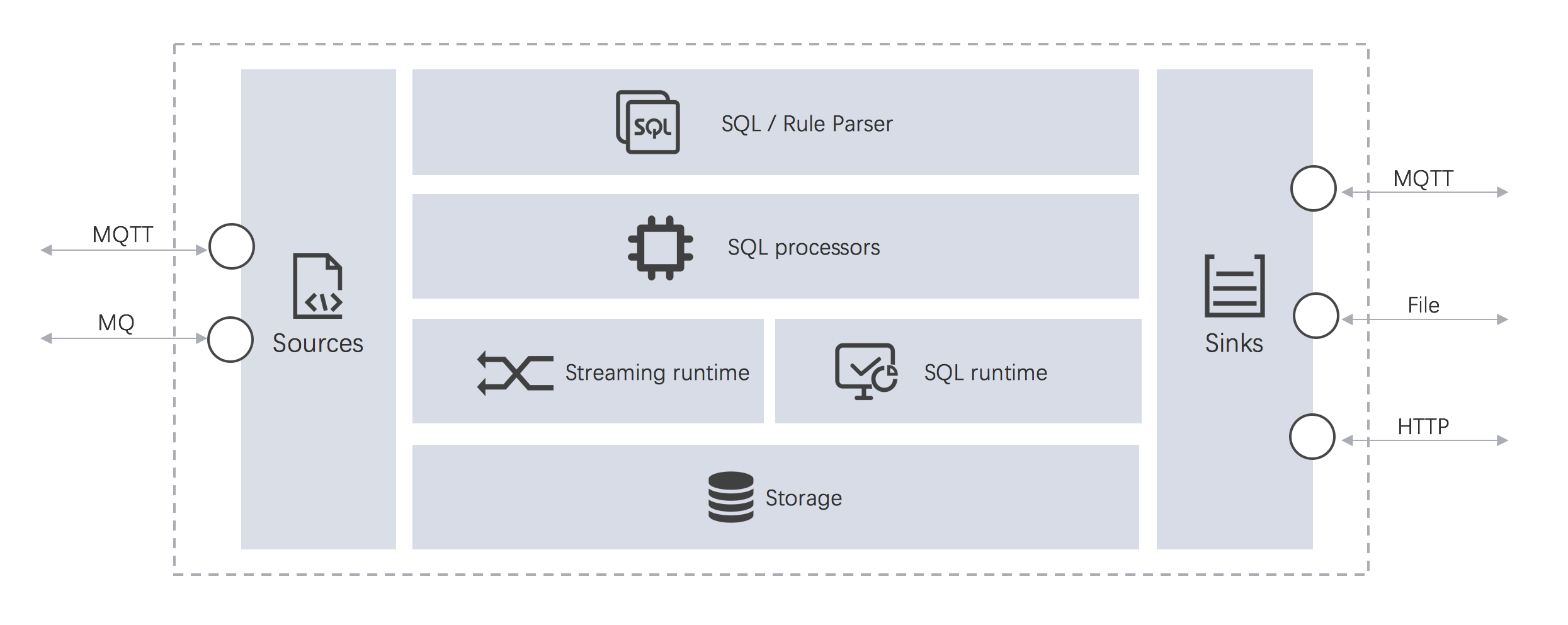概览
在 EdgeX Geneva 版本中, EMQ X Kuiper - 基于 SQL 的轻量级流式数据处理软件与 EdgeX 进行了集成。在进入这篇教程之前,让我们先花一些时间来了解一些 Kuiper 的基本知识。EMQ X Kuiper 是 Golang 实现的轻量级物联网边缘分析、流式处理开源软件,可以运行在各类资源受限的边缘设备上。Kuiper 基于源 (Source),SQL (业务逻辑处理), 目标 (Sink) 的方式来支持流式数据处理。
-
源(Source):流式数据的数据源,例如来自于 MQTT 服务器 的数据。在 EdgeX 的场景下,数据源就是 EdgeX 消息总线(EdgeX message bus),可以是来自于 ZeroMQ 或者 MQTT 服务器;
-
SQL:SQL 是你流式数据处理指定业务逻辑的地方,Kuiper 提供了 SQL 语句可以对数据进行抽取、过滤和转换;
-
目标(Sink):目标用于将分析结果发送到特定的目标。例如,将分析结果发送到另外的 MQTT 服务器,或者一个 HTTP Rest 地址;

使用 Kuiper,一般需要完成以下三个步骤。
- 创建流,就是你定义数据源的地方
- 写规则
- 为数据分析写 SQL
- 指定一个保存分析结果的目标
- 部署,并且运行规则
该教程描述如何使用 Kuiper 处理来自于 EdgeX 消息总线的数据。
Kuiper EdgeX 集成
在不同的微服务之间,EdgeX 使用消息总线进行数据交换。它包含了一个抽象的消息总线接口,并分别实现了 ZeroMQ 与 MQTT,在不同的微服务之间信息交互的支持。Kuiper 和 EdgeX 的集成工作包含了以下三部分,
-
扩展了一个 EdgeX 消息总线源,支持从 EdgeX 消息总线中接收数据
-
为了可以分析数据,Kuiper 需知道传入的数据流的格式。一般来说,用户最好在创建流的时候指定被分析的流数据的格式。如下所示,一个
demo流包含了一个名为temperature的字段。这与在关系型数据库中创建表格定义的时候非常像。在创建了流定义以后,Kuiper 可以在编译或者运行时对进入的数据进行类型检查,相应错误也会报告给用户。CREATE STREAM demo (temperature bigint) WITH (FORMAT="JSON"...)然而在 EdgeX 中,数据类型定义在 EdgeX
Core contract Service中已经指定,为了提升使用体验,用户可以在创建流的时候不指定数据类型。Kuiper 源会在初始化规则的时候,从Core contract Service中获取所有的value descriptors定义(所以如果有任何数据类型定义的变化,你需要重启规则)。当接收到来自于消息总线的数据的时候,会根规则转换为相应的数据类型。 -
扩展支持 EdgeX 消息总线目标(sink),用于将处理结果写回至 EdgeX 消息总线。用户也可以选择将分析结果发送到 Kuiper 之前已经支持的 RestAPI 接口等。

运行 EdgeX Docker 实例
打开 EdgeX develop-scripts 项目,并且下载 Geneva 版本的 Docker compose file,然后启动所有的 EdgeX 容器。
# docker-compose -f ./docker-compose-nexus-redis-no-secty.yml up -d --build
所有的容器启动完毕之后,请使用 docker ps 命令确定所有的容器已经正常启动。
$ docker ps
CONTAINER ID IMAGE COMMAND CREATED STATUS PORTS NAMES
5618c93027a9 nexus3.edgexfoundry.org:10004/docker-device-virtual-go:master "/device-virtual --p…" 37 minutes ago Up 37 minutes 0.0.0.0:49990->49990/tcp edgex-device-virtual
fabe6b9052f5 nexus3.edgexfoundry.org:10004/docker-edgex-ui-go:master "./edgex-ui-server" 37 minutes ago Up 37 minutes 0.0.0.0:4000->4000/tcp edgex-ui-go
950135a7041d emqx/kuiper:0.3.1 "/usr/bin/docker-ent…" 37 minutes ago Up 37 minutes 0.0.0.0:20498->20498/tcp, 9081/tcp, 0.0.0.0:48075->48075/tcp edgex-kuiper
c49b0d6f9347 nexus3.edgexfoundry.org:10004/docker-support-scheduler-go:master "/support-scheduler …" 37 minutes ago Up 37 minutes 0.0.0.0:48085->48085/tcp edgex-support-scheduler
4265dcc2bb48 nexus3.edgexfoundry.org:10004/docker-core-command-go:master "/core-command -cp=c…" 37 minutes ago Up 37 minutes 0.0.0.0:48082->48082/tcp edgex-core-command
4667160e2f41 nexus3.edgexfoundry.org:10004/docker-app-service-configurable:master "/app-service-config…" 37 minutes ago Up 37 minutes 48095/tcp, 0.0.0.0:48100->48100/tcp edgex-app-service-configurable-rules
9bbfe95993f5 nexus3.edgexfoundry.org:10004/docker-core-metadata-go:master "/core-metadata -cp=…" 37 minutes ago Up 37 minutes 0.0.0.0:48081->48081/tcp, 48082/tcp edgex-core-metadata
2e342a3aae81 nexus3.edgexfoundry.org:10004/docker-support-notifications-go:master "/support-notificati…" 37 minutes ago Up 37 minutes 0.0.0.0:48060->48060/tcp edgex-support-notifications
3cfc628e013a nexus3.edgexfoundry.org:10004/docker-sys-mgmt-agent-go:master "/sys-mgmt-agent -cp…" 37 minutes ago Up 37 minutes 0.0.0.0:48090->48090/tcp edgex-sys-mgmt-agent
f69e9c4d6cc8 nexus3.edgexfoundry.org:10004/docker-core-data-go:master "/core-data -cp=cons…" 37 minutes ago Up 37 minutes 0.0.0.0:5563->5563/tcp, 0.0.0.0:48080->48080/tcp edgex-core-data
9e5091928409 nexus3.edgexfoundry.org:10004/docker-support-logging-go:master "/support-logging -c…" 37 minutes ago Up 37 minutes 0.0.0.0:48061->48061/tcp edgex-support-logging
74e8668f892c redis:5.0.7-alpine "docker-entrypoint.s…" 37 minutes ago Up 37 minutes 0.0.0.0:6379->6379/tcp edgex-redis
9b341bb217f9 consul:1.3.1 "docker-entrypoint.s…" 37 minutes ago Up 37 minutes 0.0.0.0:8400->8400/tcp, 8300-8302/tcp, 8301-8302/udp, 8600/tcp, 8600/udp, 0.0.0.0:8500->8500/tcp edgex-core-consul
ed7ad5ae08b2 nexus3.edgexfoundry.org:10004/docker-edgex-volume:master "/bin/sh -c '/usr/bi…" 37 minutes ago Up 37 minutes edgex-files
创建流
该步骤是创建一个可以从 EdgeX 消息总线进行数据消费的流。有两种方法来支持管理流,你可以选择喜欢的方式。
方式1: 使用 Rest API
请注意: EdgeX 中的 Kuiper Rest 接口使用48075端口,而不是缺省的9081端口。所以在 EdgeX 调用 Kuiper Rest 的时候,请将文档中所有的 9081 替换为 48075。
请将 $kuiper_server 替换为本地运行的 Kuiper 实例的地址。
curl -X POST
http://$kuiper_server:48075/streams
-H 'Content-Type: application/json'
-d '{
"sql": "create stream demo() WITH (FORMAT="JSON", TYPE="edgex")"
}'
关于其它 API,请参考该文档.
方式2: 使用 Kuiper 命令行
使用以下命令,进入运行中的 Kuiper docker 实例。
docker exec -it kuiper /bin/sh
使用以下命令,创建一个名为 demo 的流定义.
bin/cli create stream demo'() WITH (FORMAT="JSON", TYPE="edgex")'
其它命令行,请参考该文档。
现在流已经创建好了,但是你可能好奇 Kuiper 是如何知道消息总线的地址和端口,因为此类信息在 CREATE STREAM 并未指定。实际上这些信息是在配置文件 etc/sources/edgex.yaml 中指定的,你可以在命令行窗口中输入 cat etc/sources/edgex.yaml 来查看文件的内容。如果你有不同的服务器、端口和服务的地址,请更新相应的配置。正如之前提到的,这些配置选项可以在容器启动的时候进行重写。
#Global Edgex configurations
default:
protocol: tcp
server: localhost
port: 5566
topic: events
serviceServer: http://localhost:48080
.....
更多关于配置文件的信息,请参考该文档.
创建规则
让我们创建一条规则,将分析结果发送至 MQTT 服务器,关于 MQTT 目标的相关配置,请参考这个链接。与创建流的过程类似,你可以选择使用 REST 或者命令行来管理规则。
以下例子将选出所有 events 主题上所有的数据,分析结果将被
- 发布到公共的 MQTT 服务器
broker.emqx.io的主题result上; - 打印至日志文件
选项1: 使用 Rest API
curl -X POST
http://$kuiper_server:9081/rules
-H 'Content-Type: application/json'
-d '{
"id": "rule1",
"sql": "SELECT * FROM demo",
"actions": [
{
"mqtt": {
"server": "tcp://broker.emqx.io:1883",
"topic": "result",
"clientId": "demo_001"
}
},
{
"log":{}
}
]
}
选项2: 使用 Kuiper 命令行
你可以使用任意编辑器来创建一条规则,将下列内容拷贝到编辑器中,并命名为 rule.txt。
{
"sql": "SELECT * from demo",
"actions": [
{
"mqtt": {
"server": "tcp://broker.emqx.io:1883",
"topic": "result",
"clientId": "demo_001"
}
},
{
"log":{}
}
]
}
在运行的容器中,执行以下命令。
# bin/cli create rule rule1 -f rule.txt
Connecting to 127.0.0.1:20498...
Creating a new rule from file rule.txt.
Rule rule1 was created successfully, please use 'cli getstatus rule rule1' command to get rule status.
如想将结果发送到别的目标,请参考 Kuiper 中支持的其它目标。你现在可以看一下在 log/stream.log中的日志文件,查看规则的详细信息。
time="2020-04-17T06:32:24Z" level=info msg="Serving kuiper (version - 0.3.1-4-g9e63fe1) on port 20498, and restful api on port 9081. n" file="server.go:101"
time="2020-04-17T06:32:24Z" level=info msg="The connection to edgex messagebus is established successfully." file="edgex_source.go:95" rule=rule1
time="2020-04-17T06:32:24Z" level=info msg="Successfully subscribed to edgex messagebus topic events." file="edgex_source.go:104" rule=rule1
time="2020-04-17T06:32:24Z" level=info msg="The connection to server tcp://broker.emqx.io:1883 was established successfully" file="mqtt_sink.go:161" rule=rule1
time="2020-04-17T06:32:25Z" level=info msg="Get 24 of value descriptors from service." file="edgex_source.go:223"
time="2020-04-17T06:32:25Z" level=info msg="sink result for rule rule1: [{"int32":-697766590}]" file="log_sink.go:16" rule=rule1
time="2020-04-17T06:32:25Z" level=info msg="sink result for rule rule1: [{"int8":-47}]" file="log_sink.go:16" rule=rule1
time="2020-04-17T06:32:25Z" level=info msg="sink result for rule rule1: [{"int16":-318}]" file="log_sink.go:16" rule=rule1
time="2020-04-17T06:32:25Z" level=info msg="sink result for rule rule1: [{"int64":-8680421421398846880}]" file="log_sink.go:16" rule=rule1
time="2020-04-17T06:32:31Z" level=info msg="sink result for rule rule1: [{"bool":true}]" file="log_sink.go:16" rule=rule1
监控分析结果
因为所有的分析结果都被发布到tcp://broker.emqx.io:1883,你可以直接使用以下的 mosquitto_sub 命令来监听结果,你也可以参考别的 MQTT 客户端工具.
# mosquitto_sub -h broker.emqx.io -t result
[{"bool":true}]
[{"bool":false}]
[{"bool":true}]
[{"randomvalue_int16":3287}]
[{"float64":8.41326e+306}]
[{"randomvalue_int32":-1872949486}]
[{"randomvalue_int8":-53}]
[{"int64":-1829499332806053678}]
[{"int32":-1560624981}]
[{"int16":8991}]
[{"int8":-4}]
[{"bool":true}]
[{"bool":false}]
[{"float64":1.737076e+306}]
...
你也可以敲入以下的命令来查看规则执行的状态。相关的查看规则状态的 REST API 也有提供,请检查相关文档.
# bin/cli getstatus rule rule1
Connecting to 127.0.0.1:20498...
{
"source_demo_0_records_in_total": 29,
"source_demo_0_records_out_total": 29,
"source_demo_0_exceptions_total": 0,
"source_demo_0_process_latency_ms": 0,
"source_demo_0_buffer_length": 0,
"source_demo_0_last_invocation": "2020-04-17T10:30:09.294337",
"op_preprocessor_demo_0_records_in_total": 29,
"op_preprocessor_demo_0_records_out_total": 29,
"op_preprocessor_demo_0_exceptions_total": 0,
"op_preprocessor_demo_0_process_latency_ms": 0,
"op_preprocessor_demo_0_buffer_length": 0,
"op_preprocessor_demo_0_last_invocation": "2020-04-17T10:30:09.294355",
"op_filter_0_records_in_total": 29,
"op_filter_0_records_out_total": 21,
"op_filter_0_exceptions_total": 0,
"op_filter_0_process_latency_ms": 0,
"op_filter_0_buffer_length": 0,
"op_filter_0_last_invocation": "2020-04-17T10:30:09.294362",
"op_project_0_records_in_total": 21,
"op_project_0_records_out_total": 21,
"op_project_0_exceptions_total": 0,
"op_project_0_process_latency_ms": 0,
"op_project_0_buffer_length": 0,
"op_project_0_last_invocation": "2020-04-17T10:30:09.294382",
"sink_sink_mqtt_0_records_in_total": 21,
"sink_sink_mqtt_0_records_out_total": 21,
"sink_sink_mqtt_0_exceptions_total": 0,
"sink_sink_mqtt_0_process_latency_ms": 0,
"sink_sink_mqtt_0_buffer_length": 1,
"sink_sink_mqtt_0_last_invocation": "2020-04-17T10:30:09.294423"
总结
在本教程中,我们介绍了使用 EdgeX Kuiper 规则引擎的非常简单的例子,如果使用过程中发现任何问题,请到 EdgeX,或者 Kuiper Github 中报问题。
更多练习
目前的规则没有过滤发送给 Kuiper 的任何数据,那么如何过滤数据呢?请使用删除规则,然后试着更改一下 SQL 语句,完成更改后,重新部署规则。这时候如果监听 MQTT 服务的结果主题,检查一下相关的规则是否起作用?
扩展阅读
- 阅读 EdgeX 源 获取更多详细信息,以及类型转换等。
- 如何使用 meta 函数抽取在 EdgeX 消息总线中发送的更多信息? 设备服务往总线上发送数据的时候,一些额外的信息也随之发送,比如时间创建时间,id 等。如果你想在 SQL 语句中使用这些信息,请参考这篇文章。
- EdgeX 消息总线目标. 该文档描述了如何使用 EdgeX 消息总线目标。如果你想把分析结果发送到消息总线中,你可能对此文章感兴趣。
如想了解更多的 EMQ X Kuiper 的信息,请参考以下资源。
版权声明: 本文为 EMQ 原创,转载请注明出处。
原文链接:https://www.emqx.io/cn/blog/kuiper-becomes-edgex-rule-engine
来源:oschina
链接:https://my.oschina.net/u/4174826/blog/4290084